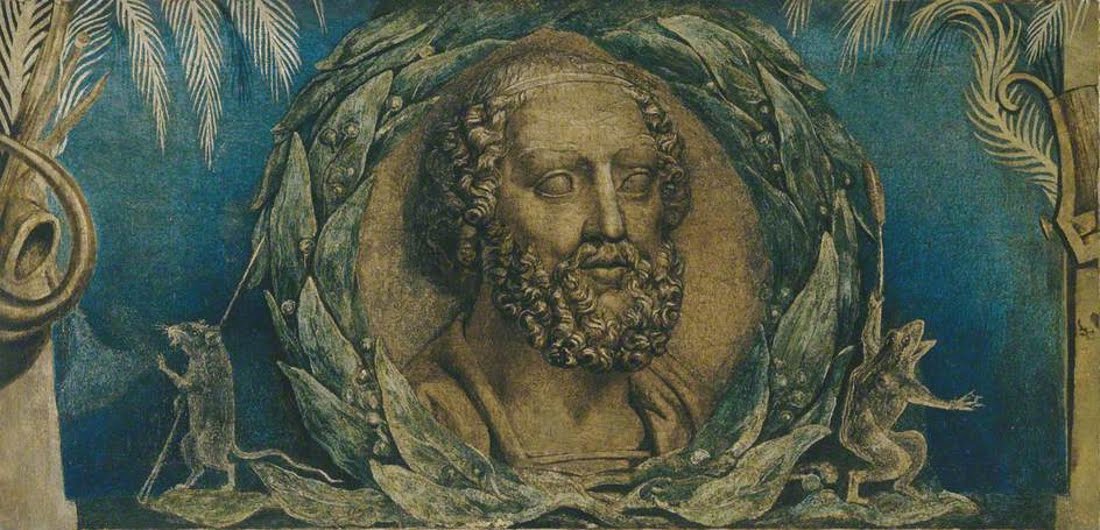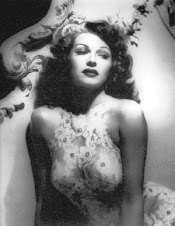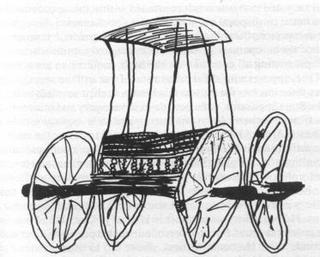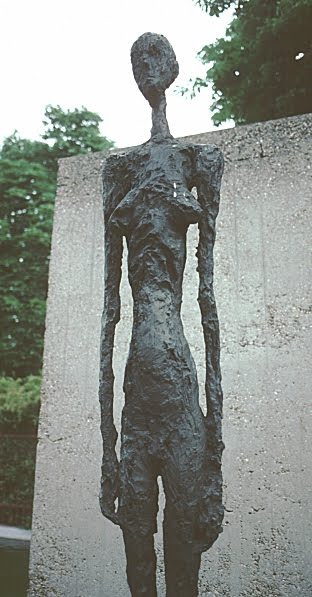2005/05/22
the space of discourse _ 2
the days of a student baby 'the years of learning' squander ____take a text, take two make a one. make_______
McGann, Stanley Fish, Webster (do?)Very interested in several aspects of the questions arising out of the reader response position as delineated by Stanley Fish.Fish's ideas grab me, and I think they provide a method for readers to approach "interpretation" with intelligence, acumen, and respect for the integrity of any given text.Using this word or term after reading McGann one feels a little self-conscious. Yet I think that McGann's respect for the "irregularities" and inconsistencies, the historical realities and contingencies surrounding the publication of a given text (i.e. Don Juan, Jerusalem, Dickinson) can and should be used in conjunction with what Fish is driving at and stating. Essentially they are discussing to different kinds of problems. Fish is discussing (as I understand it) interpretation of a text and not discussing how a given text has come to be accepted in the version which we read. McGann is concerned with the tools of interpretation after any given text has reached the reader's (the public's) eye. McGann seems to be addressing the common sense issues which are beyond argument. And one can agree that they are beyond argument. After all who would say that there are no differences between the varied publications of Dickinson's poem, or that there are no differences between the various editions of Don Juan? And that we as readers ought to have the true poem in front us. He argues that the term text ought to be distinguished from the term poem poetic work. That differences in editions have to be considered. All of which is fair - but and here's the rub, he also makes epistemological assumptions (with implied political ones built into them) about context and history; how this affects our reading, in particular of the Dickinson poem. Here he steps beyond his grounds in this reader's view. McGann for all his concerns about proper editions seems to think there is a universal method he can to establish his poems and poetic works. That there is a true way to read a poem - he cites a lot of background information (context) about Dickinson's poem which he claims we ought to and must know(McGann). This is not so, and may never be so for some readers, and even were they to know would often times become irrelevant in the passage of time. After what reader does not make her own meaning from a poem - that is of course if one can say meaning has a meaning or even exists at all. Readers (like writers) it seems to me have their own agendas and their own sense of what things are and are not. Why should McGann decide what readers need to know to fully appreciate his sense of the poem? Even when I do know all these facts I still "read" the poem differently. And most of time I don't and I suspect most readers don't.In the case of Dickinson there is a difference in that in her poem, the alterations made in the titling of the poem, lines, and one stanza, lead to a legitimate (Tate didn't read other versions) but "falsely" (that is to say, not based on the text as written by the author Emily Dickinson) constructed based reading of the text. Which served Tate's own agenda - what did one expect from a Southener with an agenda such as his interpretative community of elitist readers? Second generation Eliotians, reactionary to the core, self-protective, possibly racist, conservative and not all interested in an interpretative strategy leading to change in the political-economic-social structures which allowed and kept him and his friends their jobs. McGann seems naive to imagine a reading other than the one he gets from Tate and company. That literature and its production exist in the midst of history is a common place and is a part of received opinion; anyone who has lived in the outside world knows that, anyone who has ever voted and seen the tide of history moving to the right knows this, anyone who has ever tried to publish anything knows this, anyone who has published a book knows this. So what is what - where to from here? Why do as readers have to agree with this simple assertion to accepting a critical position which purports to be neutral and as abstract as that which it critiques? McGann does not spell out his own position with respect to any of the political or social forces surrounding publication or interpretation and thus in one respect merely recapitulates the position he criticizes; he, like the New Critics (Leavis, Richards, Brooks...and Eliot? Was Eliot a new critic? The more I read about Eliot the more uncertain I am about this: Auden said when Eliot died:appears to seek a universality, only he disguise it with moral imperatives which themselves are bleached in the aesthetic hope of being an even "closer" reader than the New Critics; he claims history (context) must be respected if the " the memory of poems etcetera" is to be passed on to new readers of each generation. And I say, which readers? From where and at what school?He also claims we ought know in Dickinson's poem to be caught up "the merely hypnotic verbal music of the poem" - what does merely verbal mean, why is the music of a poem less valuable than knowing if Emily looked out her window and saw a road leading to a cemetery or not/ What if it turns out that Emily was (just) the name of a blind female, black, poet who imagined these fictions we call poems - McGann for all his respect for the "poem" strikes one as having a rather Platonic view of things. He locates the text in some "true" pure and virtual space of context, where its real (and final) meaning will become apparent to the right reader with all the facts. But what is true, in literature? Perhaps I am too Borgesian Irish sceptical (me a Humiam)? - History is the nightmare from which I am trying to escape says Stephen Dadelus - Joyce following this cue ends writing the epic prose poem of Finnegans Wake. (With Vico as his theoretician, backing up all those wheels of history, a little like Yeat's vision book of gyres and cycles.) Now who pretends that it is possible or desirable to know all the facts surrounding this work? The specific accidents (a strangely Catholic vocabulary which reveals to this reader an odd ontological bias) and features of a poem may very well be the modern author's most clever device for throwing the reader off the trail, off the scent of the text, that text which is invisible and not subjected to the particulars of history or its accidents. Finally McGann's concerns can be seen as ethical sign-posts about how we retrieve texts: this cannot be argued with. Secondly perhaps his methodology is appropriate for some authors in a very limited sense as revealing one possible way of reading texts or poetry. For as Barthes says about Bataille, what is he a novelist, poet etcetera likewise applies to the traditional genre classifications of works. Thus the critique McGann brings forth seems to miss the point of the term "la texte." Bearing these concerns in mind, reading the Fish essay provides a reasonable method to reading a text and at least remaining honest to oneself, and not compromising oneself by aiming for a "true" and final reading. It strikes me, however sincere McGann is, that he misses the boat.Results of Fish and Levenson (for this reader),for reading of Wasteland are positive. - allows reader to make their own meaning; what one could call an appropriation technique, and in a larger sense a classless reading, classless to the extent that the reader becomes a free-er agent of her own praxis while engaged in this type of reading - for one reads the tacit sense of a text and this tacit reading will of course, reflect the interpretative community one comes from. It frees the poem to be instead of meaning (MacLeish); in this being we emerge and make (in the sense of invention and participation) our own understanding and meaning; the phrase being instead of meaning comes from Archibald Macleish who has a poem called A Poem Should Be instead of Mean.Fish's strengths allow for any resident (and not just any, but the expected amount of ambiguity needed to make poetry), ambiguity in the poem to be unresolved i.e. in any reductionist desire to resolve a final meaning to a poem i.e. especially in terms of attributing a specific and particular intention to the author. The result is that the poem's richness remains intact, (as Fish points out, it is left to the Reader to decide the moral meanings of the pome for herself), thereby allowing readers to experience and re-experience the diversity of "meanings" in a poem for themselves and with other people. Lines of interpretation are no longer necessarily in conflict in the poem itself, but are presented as matters or issues for the reader to resolve him or herself. And when they are in conflict, why do we feel this constant need to "resolve" them? Let them be is what I say.Literary theory ought to have practical significance, which is to say its theorizing must make relevance and meaning for individual readers; there is a praxis that goes against alienation in each of us lives, and it is this that should be resolved, and not the endless "meanings" of a text. As Deleuze states in an old interview with Foucault (Counter-Memory, p. 206) theory should become a practice. The moral question in the Milton sonnet exemplifies this.I also believe Milton would be contented with this particular result coming about from his sonnet. Milton of course was concerned with moral choices, and with this method the "burden" or "delight" of choice is put where it belongs, with the reader. Secondly, [but not secondarily] when I read, especially poetry, the pleasure I derive as a reader begins with the music and beauty of the subject-object that I think a poem in fact is. That is a poem is a subject to the extent it has created a charge (pound's term) which at least allows it to out-live its purely jour-a-jour (daily-journalistic) denotative existence. Entering into the "hyper-reality of a Texte, [French spelling, this is deliberate, part of my own 'de-construction technique], and its performance, firstly its reading, and whatever follows upon that, I enter into a domain of eternity where the poems always exist in the books; (I tried to touch on this last semester in my essay on Lycidas) the poems are the formal content of this eternity and are as its very substance, its expression, the bones of its body; these texts always will exist in the libraries of collective ownership. But this is only partially true, let us say "public" ownership is a better expression because collective ownership has no real meaning or sense in our world. Not that I am referring to communist idea of "collective" ownership - obviously I am a social-egalitarian anarchist, meaning the only model I can see working in history for all people is the French Commune, Kronstadt, the Spanish Republic, May 68 and various ongoing experiments occurring right now around the world. In any case, notwithstanding the constant trade and commercial coming and going of the books in the world of commodity objects - one of the many sorrows of alienation (Hakim Bey- Autonomy texts). That domain is also a realm of music, where at least half the meaning of the poem is its perception in the reciting of it, and the music which accompanies that recital; this music varies from author to author, (i.e. metrical tendencies, period of authorship etc. sensibility etcetera.), poet to poet, talent to talent and in some cases, genius. The magic of the music of the words is their baking (it's cooking in slang) in the ambiguous shiftings which occur throughout non-book eternity, that is to say history as it is spoken (as Joyce states at Finnegans Wake, history as she is syung) everywhere by women and men. I respect that text and the person who was the instrument of its ecriture, its inscription, however that inscription took place. The person, in the Greek sense, the mask through which the sound passes through, or more Biblically put, the eye of the needle, was an individual i.e. Emily or Sylvia Plath, or Antonin Artaud. I ask myself, do I make them sick when I speak or write about their work? And this is why I treat a poem as a subject-object, because one might say - here is the living person of Milton, let me be considerate of them when in their company. The book is the formal aftermath of the word, that is, its immediate enactment and embodiment; thus it is alive, has a gender, a sense of things, a memory, even a future. It is an object as well which must be treated carefully, daintily at times, but also with powerful works, one which can withstand the shocks and rude wearing away of life's erosions.This richness is often lost or pushed aside as readers quarrel or engage in debate and argument over what they imagine to be the "true" meaning of a poem. As Fish phrases it there is no longer a problem to be solved in the formalist (positivist, reductionist sense) manner, but rather we have an experience which signifies. What is signifies will vary from reader to reader as they see fit.There is more to this as Fish describes what he calls the interpretative community. Communities are defined by different interests and epistemological biases. Clearly a reader of Afro-American descent will interpret differently from say a house-wife of Anglo-Irish origins in Halifax. Although the differences are not simply those of locale. How one knows and "reads" the world, the particulars of ones daily existence, one's class, religious beliefs if any, all these will come to bear when reading a text. These contingencies reveal Fish's point most clearly. There are communities which are changing and the strategies they employ, change and as the need arises. Perhaps my understanding of Fish is too lean too close to the exterior of what he calls contingencies, or what I would call history.
Although this may be more of terminological difference than an actual difference.And this is where McGann weighs in. McGann puts more emphasis on the particular historical context that any given poem arises out of. This is illustrated in his discussion of the Emily Dickinson poem. This point of view is one I disagree with for several reasons. McGann claims one cannot fully appreciate the text of a poem (terms which he would disagree with) unless "we reconstitute if we wish to focus and explain the special emotional character of the work." (Rylance, p.192) The key word here is reconstitute. What he means by this is having all the available facts about the work at one's fingertips. I do not agree with this interpretative strategy at all. Having more facts about the graveyard and the road which Emily could see when she looked out her window may help some readers, and it may add an exterior anterior knowledge to one's perception "about" the poem, but for me it adds nothing of substance. This is where Fish's criticism sees more valuable to your average educated reader.Quinn...McGann...Fish continued ImplicationsJoyce thought E. did not need the notes - but then Joyce was writing Finnegans Wake by then; whereas he commissioned Stuart Gilbert to write the first Readers guide to Ulysses simply called James Joyce's Ulysses - A study. I read this book at 19. Still have my very marked up copy...Quinn's reaction to Pound's cuts in the poem is interesting. What would have been more exciting would have been to know what parts he objected to in Pound's editing.Was Eliot unduly influenced by Pound's judgment? Ought the poem to be re-published as a legitimate text in a single volume, and more specifically in trade edition in other words in standard Faber & Faber edition?Given the over-all Pound-Eliot neo-classical return to anon-Romantic, less revolutionary more conservative stance, was the construction of the poem under Pound's editorship one aspect of the over-all programme both writers were engaged in?With reference to McGann's techniques one would have to gather all the particular's of Eliot's life to truly appreciate the poem. This may be interesting, but it would not appeal to may readers who have no interest in that domain of a writer's existence. That is to say his life, which in Eliot's case was one he wanted escape from as in his remark "Poetry is not a turning loose of emotion, but an escape from personality. But, of course, only those who have personality and emotions know what it means to want to escape from these things. " (Eliot 11) Besides the arrogance in E's tone, many of us know what it means to want to escape. But we don't all become right-wing conservatives in the process. (All this work is so weary, and time consuming, why do we do it?) In the light of these remarks McGann's methods provide no clue to the significances of Eliot's project. In the light of these remarks McGann's methods provide no clue to the significances of Eliot's project.






